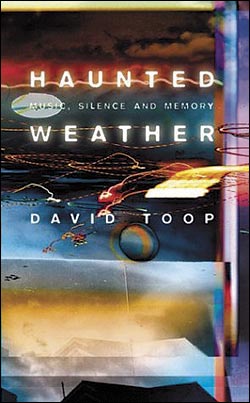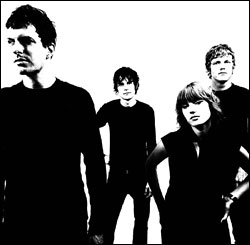A few months ago, a music writer friend surprised me in the midst of a long phone conversation by punctuating a lament for 2005’s dearth of worthy releases by saying, “You probably had a better year than me; you listen to more metal.” His observation carried nary a trace of irony or disdain. He was right, I agreed. He had to be. After all, I’d already tapped several metal albums for inclusion on year-end “best-of” lists.
The coming year looks better still. Why? Metal is changing, faster than even me. Granted, my 20th-century self might have been less likely to embrace Meshuggah’s rhythmic conundrums or Opeth’s transdimensional prog excursions, and probably would have denied Pelican genre status altogether. After all, post-rock was post-rock, no matter how big the guitars.
Thank [insert deity or demon], nobody’s throwing “post-metal” around just yet, even though opportunities abound: Metal’s mating with its kissing cousin, noise (in the broadest possible sense), has spawned a horde of mutant micro-genres ranging from ambient black metal to crushing drone, while similar acts with sibling hardcore are turning the ex-haven for misogyny, misanthropy, and all-around malicious mischief into a bastion of social responsibility. You want belief systems? Christian metal is huge and often corn-free—even exotic—while acolytes of Satan enjoy more options than ever. From triple-faced Hecate to Knobby the Gnome, overt anarcho-syndicalism to implicit monarchism, metal and its affinities offer a selection of conviction pegs unmatched by any genre in the history of music.
For the polymorphously polytheistic likes of myself, metal’s cultural and ideological variety count as major assets. Still, Knut and Gojira—both Gaia-worshipping, environmentalist bands from Francophone Europe—could be watercress-on-white-bread Episcopalian and maintain a place in my heart, as long as their heaviness and harmonic generosity didn’t wither. Like Hydra Head labelmates Isis, Knut (pronounced “noot,” after a type of Russian whip) build on the ’80s and ’90s experiments of U.K. meta-metal magisters Godflesh and their nonmetal kin: My Bloody Valentine, Mogwai, and Swans, all of whom explored the inherent possibilities of volume, density, and mass long and hard back when heads still took Deicide seriously.
Not that the Geneva-based quartet have abandoned King Riff altogether, even on November-released Terraformer (Hydra Head), their third album in 10 years. Sure, opener “7.08”‘s minor-key guitar fantasia floats down a river of drumless sludge thickened with preliminal spoken-word bits. But the track is merely an intro for doomfest “Wyriwys.” “What you reap/Is what you sowed,” singer Didier Severin admonishes, eschewing death and black cartoon conventions in favor of fleshy groans and shrieks underpinned by a turgid grid suggestive of Sabbath magnified tenfold.
The album travels among worlds well and often. While its first half is blues-based neck-brace bait, “Kyoto” resolves in a vast sea of triplet-driven chords overlaid for maximum interpenetration. Even less conventional, “Solar Flare” proceeds slow and stately as Hatshepsut’s funeral over a drone so profoundly corroded, you’d think you had cracked every membrane in your speakers were it not for the track’s diamond-clear electronic chittering. Gently swelling closer “Fibonacci Unfolds” isn’t metal at all.
It doesn’t have to be. Stealing from not-metal is one of the genre’s best and oldest tricks. Goodness knows, German long-timers Helloween‘s Keeper of the Seven Keys: The Legacy would be a far shorter work without it. Take away the double-disc epic’s operatic interludes, massed choirs, and Broadway-ready schlock, and you might have enough guitar-based quaintness to fill a 3-inch. Maybe. The album isn’t bad, it’s simply hilarious. I’m tempted to play it for friends who never listen to metal while telling them, “It’s all like this now.”
Instead, I treat ’em to Gojira‘s third album, From Mars to Sirius. The Bayonne-based quartet share much with their Swiss compatriots: environmental activism, appetite for invention, absence of mean and/or salacious sentiments, veteran status (Gojira formed in 1996), DIY production big as all outdoors, and a common language neither use in songs. (English enjoys continued hegemony in metal.) But they’ve fought their way to future-as-now via an altogether different route, splicing and recombining code authored by Meshuggah, Morbid Angel, Neurosis, and Strapping Young Lad to generate the last word (for the moment) in bio-metallic symbiosis.
Inspiration notwithstanding, the band are easily Knut’s match in antitraditionalism. “Ocean Planet” finds them bending majestic chords and rectilinear riffery around stratagems, tics, and spasms that could put Muse’s Matthew Bellamy under the drawing board, tentacles waving helplessly. “Mountainous waves/Are breaking on my despair/Awaken me/But I’m still dreaming,” singer and guitarist Joe Duplantier intones melodiously, inserting just enough rasp to justify the band’s handle. (“Gojira” is Godzilla’s Japanese name.)
Like Knut, the band lingers in metal-free zones, lightening “In the Wilderness” with extended whiffs of a Tortoise untouched by rhythmic overelaboration. Duplantier and company ditch riff and grit in favor of gently fingerpicked guitars and wispy harmonies for the duration of pastoral space ballad “From Mars.” But they never go too far. “To Sirius” blazes like a blast-beat-driven star cruiser in battle. But its lyrics are so cute! “Now I fly/From a solar system to another,” Duplantier roars. “I come with life in my veins.” Is “I” the band’s namesake? Maybe not. After all, unicorns and flying whales get songs, on From Mars, too, just like global warming. For all anyone knows, “I” could be some kind of pan-species aggregate.
Gojira’s lyrics highlight metal’s biggest source of momentum (not counting global turmoil and general discontent): its unabashed sense of adventure. Think about it: Indie rock, dance pop, country, rap—has a single artist in any of those realms so much as mentioned flying whales, let alone given them an entire song? Hah! In some other universe, maybe. If so, I bet metal did it first there, too. Metal—yum.







